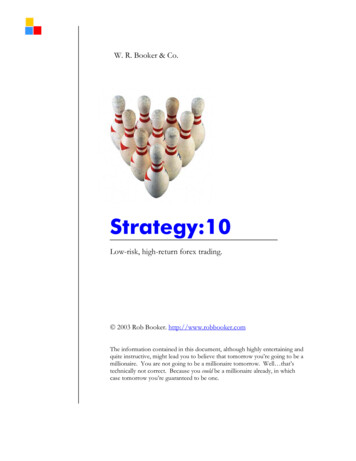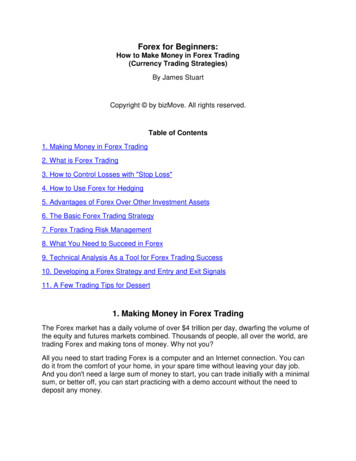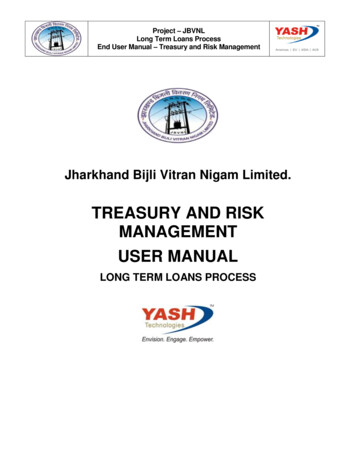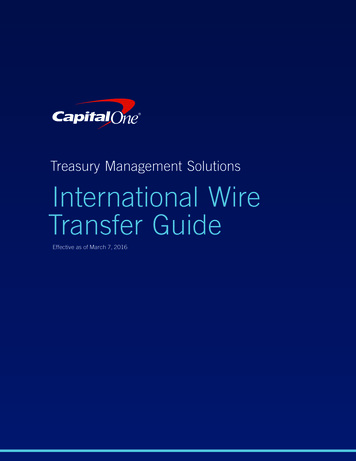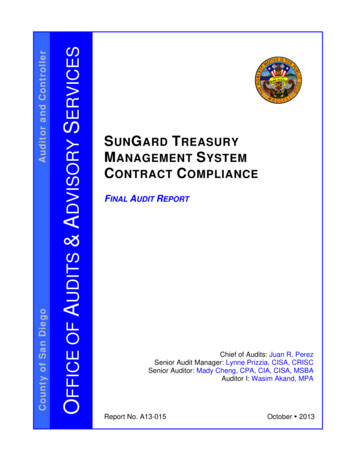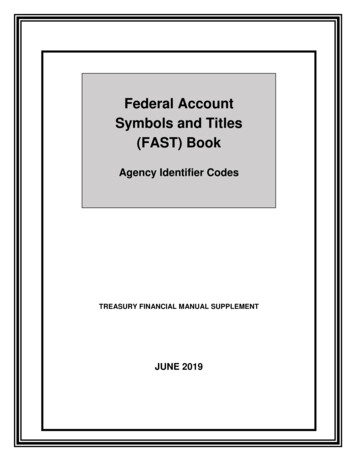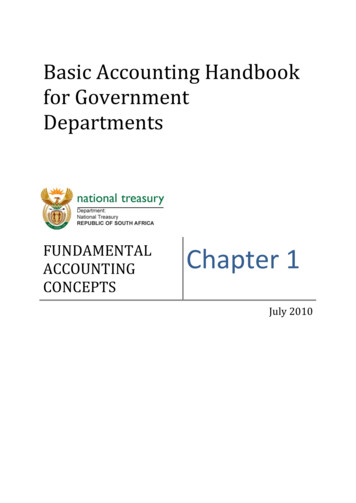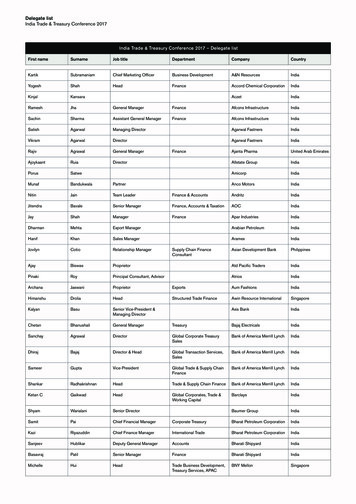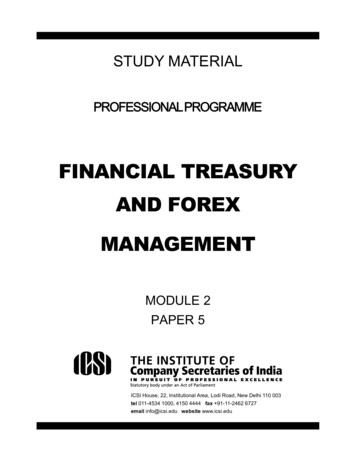
Transcription
STUDY MATERIALPROFESSIONAL PROGRAMMEFINANCIAL TREASURYAND FOREXMANAGEMENTMODULE 2PAPER 5ICSI House, 22, Institutional Area, Lodi Road, New Delhi 110 003tel 011-4534 1000, 4150 4444 fax 91-11-2462 6727email info@icsi.edu website www.icsi.edui
THE INSTITUTE OF COMPANY SECRETARIES OF INDIATIMING OF HEADQUARTERSMonday to FridayOffice Timings – 9.00 A.M. to 5.30 P.M.Public Dealing TimingsWithout financial transactions – 9.30 A.M. to 5.00 P.M.With financial transactions – 9.30 A.M. to 4.00 P.M.Phones41504444, fo@icsi.eduLaser Typesetting by AArushi Graphics, Prashant Vihar, New Delhi, andPrinted at MP Printersii
FINANCIAL, TREASURY AND FOREX MANAGEMENTThe company secretaries by virtue of their expertise in the corporate laws and procedure are in eminentlysuitable position to:(a) Present to the Board of Directors, the financial, legal and personnel aspects of modernisation, expansion,diversification of the existing projects of new projects;(b) Obtain the decision from the Board; and(c) Interact effectively with the financial institutions in the process of procuring the finance.The legal aspects of finance are becoming increasingly important and a Company Secretary is expected tosuccessfully and effectively handle, amongst other things, important aspects such as management of publicissues, syndication of loans, obtaining project approvals, raising of finance through public deposits and debenturesor bonds etc. All these essentials require expert knowledge of diverse and complex procedures involved. Realisingthat the services of a Company Secretary could be of immense use in this important area, it was thoughtnecessary to include this paper with a view to equip the students with the requisite fundamentals of the FinancialManagement.It has been the endeavour to provide a blend of theoretical concepts and practical orientation. Topics, such as,raising finance from financial institutions, dividend policies, etc. requiring legal expertise and procedural knowledgehave been written with a legal bias. Topics such as, project appraisal, financial planning, portfolio managementand securities analysis, working capital management and capital budgeting decisions, treasury management,forex management, commodity exchange and derivatives have been written keeping in view the financialmanagement principles and the practical utility. Ample number of practical problems and case studies havebeen added to aid the student in their learning process.Though efforts have been made to provide a self-contained study material yet it may require regularsupplementation as the subject is of a dynamic and fast changing nature. Students are advised to update theirknowledge continuously by reading economic dailies, financial magazines and journal and other relevant literatureincluding reference and suggested readings on the subject. Students are expected to learn the art of applyingthe principles of financial management to real business situations and for this case studies in the area of financewould prove to be of immense use.The legislative changes made upto June 30, 2017 have been incorporated in the study material. However, itmay so happen that some developments might have taken place during the printing of the study material and itssupply to the students. The students are therefore, advised to refer to the e-bulletin and other publications forupdation of the study material.Although care has been taken in publishing this study material, yet the possibility of errors, omissions and/ordiscrepancies cannot be ruled out. This publication is released with an understanding that the Institute shall notbe responsible for any errors, omissions and/or discrepancies or any action taken in that behalf.Should there be any discrepancy, error or omission noted in the study material, the Institute shall be obliged ifthe same are brought to its notice for issue of corrigendum in the Student Company Secretary e-bulletin. In theevent of any doubt, students may write to the Directorate of Professional Development, Perspective Planningand studies in the Institute for clarification at academics@icsi.edu.iii
SYLLABUSMODULR II, PAPER 5: FINANCIAL, TREASURY AND FOREX MANAGEMENT (100 Marks)Level of Knowledge: Expert KnowledgeObjective: To acquire expert knowledge of practical aspects of the management and techniques of financial,treasury and forex management.Detailed Contents:1. Economic Framework1. Nature and Scope of Financial ManagementNature, Significance, Objectives and Scope (Traditional, Modern and Transitional Approach), Risk-Returnand Value of the Firm, Financial Distress and Insolvency, Financial Sector Reforms and their Impact, Functionsof Finance Executive in an Organisation2. Capital BudgetingTime Value of Money, Planning and Control of Capital Expenditure, Capital Budgeting Process Techniquesof Capital Budgeting- Discounted and Non- Discounted Cash Flow Methods, Choice of Methods CapitalRationing; Risk Evaluation and Sensitivity Analysis, Simulation for Risk Evaluation Linear Programmingand Capital Budgeting Decisions – under Constraints and with Multiple Objectives using MathematicalProgramming Models, Inflation, Uncertainty and Evaluation using Statistical Decision Theory, Analysis ofCapital Budgeting, Decisions- Some Case Studies3. Capital StructureMeaning and Significance, Capital Structure vis-à-vis Financial Structure; Planning and Designing; OptimalCapital Structure, Determinants of Capital Structure; Capital Structure and Valuation - Theoretical Analysis,EBIT - EPS Analysis, EBITDA Analysis (Earnings before Interest, Tax, Depreciation and Amortization), Riskand Leverage; Measures of Operating and Financial Leverage, Effects of Leverage on Shareholders’ Returns4. Cost of CapitalMeaning; Factors Affecting Cost of Capital ,Measurement of Cost of Capital, Weighted Average Cost ofCapital, Marginal Cost of Capital5. Financial ServicesMeaning, Significance, Scope and Structure of Financial Services, Types of Financial Services- MerchantBanking, Securitization of Debt, Loan Syndication, Housing Finance, Custodial and Advisory6. Project FinanceProject Planning - Preparation of Project Report, Project Appraisal under Normal, Inflationary and DeflationaryConditions, Project Appraisal by Financial Institutions - Lending Policies and Appraisal, Norms by FinancialInstitutions and Banks; Loan Documentation, Project Review and Control; Social Cost and Benefit Analysisof Project. (UNIDO Approach), Term Loans from Financial Institutions and Banks; Lease and Hire PurchaseFinance; Venture Capital Funds; Private Equity; International Finance and Syndication of Loans, DeferredPayment Arrangements; Corporate Taxation and its Impact on Corporate Financing, Financing CostEscalationiv
7. Dividend PolicyIntroduction; Types, Determinants and Constraints of Dividend Policy Forms of Dividend Different DividendTheories - Walter’s Model, Gordon’s Model and Modigliani-Miller Hypothesis of Dividend Irrelevance DividendPolicy - Practical and Legal Constraints Corporate Dividend Practices in India8. Working CapitalMeaning, Types, Determinants and Assessment of Working Capital Requirements, Negative Working CapitalOperating Cycle Concept and Applications of Quantitative Techniques Management of Working Capital Cash, Receivables, Inventories; Financing of Working Capital; Banking Norms and Macro Aspects Factoringand Forfeiting9. Security Analysis and Portfolio ManagementSecurity Analysis - Measuring of Systematic and Unsystematic Risk, Fundamental Analysis (Economic,Industry and Company), Technical Approach and Efficient Capital Market TheoryPortfolio Management - Meaning, Objectives; Portfolio Theory -Traditional Approach; Fixed and VariableIncome Securities, Markowitz Portfolio Theory; Modern Approach - CAPM Model; Economic Value Added,Sharpe Single & Multi Index Model; Arbitrage Pricing Theory (APT); Risk Adjusted Measure of Performance10. Derivatives and Commodity Exchanges- An Overview11. Treasury ManagementMeaning, Objectives, Significance, Functions and Scope of Treasury Management, Relationship betweenTreasury Management and Financial Management; Role and Responsibilities of Chief Finance OfficerTools of Treasury Management; Internal Treasury, Controls; Environment for Treasury Management, LiquidityManagement, Regulation, Supervision and Control of Treasury Operations, Implications of Treasury onInternational, Banking12. Forex ManagementNature, Significance and Scope of Forex Management, Foreign Exchange Market and its Structure, ForeignExchange Rates and its Determination, Exchange Rate Quotes; Types of Exchange Rates; Forex Trading;Currency Futures and Options, Foreign Exchange Risk Exposures and their Management; ExchangeRate Forecasting; Risk in Foreign Exchange Business13. Practical Problems and Case Studiesv
LIST OF RECOMMENDED BOOKSMODULE 2PAPER 5 : FINANCIAL, TREASURY AND FOREX MANAGEMENTThe students may refer to the given books and websites for further knowledge and study of the subject :READINGS1. M.Y. Khan & P.K. Jain: Financial Management – Text and Problems; Tata McGraw Hill PublishingCo. Ltd., New Delhi.2. Prasanna Chandra: Financial Management – Theory & Practice; Tata McGraw Hill PublishingCo. Ltd., New Delhi.3. I.M. Pandey: Financial Management (2005); Vikas Publishing House Pvt. Ltd., New Delhi.4. R.P. Rustagi: Strategic Financial Management – Taxmann Publication Pvt. Ltd.5. R. Charles Moyer,James R. McGuign &William J. Kretlow: Contemporary Financial Management; West Publishing Company.6. Rajiv Srivastava &Anil Mishra: Financial Management, Oxford University Press7. J.B. Gupta: Strategic Financial Management – Taxmann Publication Pvt. Ltd.8. Ravi M. Kishore: Strategic Financial Management – Taxmann Publication Pvt. Ltd.vi
ARRANGEMENT OF STUDY LESSONSStudy Lesson No.Topic1.Nature and Scope of Financial Management2.Capital Budgeting3.Capital Structure Decisions4.Cost of Capital5.Financial Services6.Project Finance7.Dividend Policy8.Working Capital9.Securities Analysis and Portfolio Management10.Derivatives and Commodity Exchanges – An Overview11.Treasury Management12.Forex Management13.Practical Problems and Case Studiesvii
CONTENTSFINANCIAL, TREASURY AND FOREX MANAGEMENTLESSON 1NATURE, SIGNIFICANCE AND SCOPE OF FINANCIAL MANAGEMENTMeaning of Finance2Definition of Finance2Definition of Business Finance2Definition of Financial Management2Nature, Significance and Scope of Financial Management2Investment Decisions3Financing Decisions4Dividend Decisions5Decision Criteria5Objectives of Financial Management7Profit Maximisation7Wealth Maximisation8Profit Maximization Versus Shareholder Wealth Maximization9Economic Value-Added (EVA)9Value of Firm-Risk And Return11Liquidity11Profitability13Costing and Risk14Financial Distress and Insolvency16Financial Management as Science or Art16Functions of Financial Executives17Financial Sector – Role and Functions18Financial Sector Reforms in India – Background19Financial Sector Reforms in India: Philosophy and Strategy19Pre-requisites for Reforms in Financial Sector20Salient Features of Financial Sector Reforms in India20Policy Framework20Improvement in Financial Health22viii
PageInstitutional Strengthening22Financial Sector Reforms – Present Scenario22Financial Sector Legislative Reforms Commission, 201125Purpose of formation25FSLRC moots single regulator25Consumer protection25Financial Regulatory Architecture Act26Judicial review26Financial Sector Reforms: Some Criticisms26Financial Management – A New Look26LESSON ROUND-UP27SELF-TEST QUESTIONS28LESSON 2CAPITAL BUDGETINGIntroduction30Definitions30Time Value of Money30Introduction30Why Rs. 1 received today worth more than 1 Rs. Received after a time period31Use of Time Value of Money31Future Value of a lump sum31Present Value of a cash flow stream32Net Present Value32Capital Budgeting- Planning and Control of Capital Expenses33Need for Capital Investment33Investment Decisions – Management Perspective34Importance of Capital Budgeting35Factors Influencing Investment Decision35Rationale of Capital Budgeting Decisions36Kinds of Capital Budgeting Decisions37Planning of Capital Expenditure37Capital Expenditure Control38Capital Rationing38ix
PageCapital Budgeting Process39Investment Criteria41The Payback Method41The Average Accounting Rate of Return (ARR) Method43Discounted Cash Flow (DCF) Method45Comparison of Net Present Value and Internal Rate of Return Approach51Points of Differences51Points of Similarities52Choice of Methods53Limits on Investment53Risk Evaluation and Sensitivity Analysis54Risk Evaluation54Sensitivity Analysis57Simulation for Risk Evaluation58Linear Programming and Capital Budgeting Decisions58Application of Linear Programming Model59Primal59Dual Problems61Some Case Studies69LESSON ROUND-UP77SELF-TEST QUESTIONS78LESSON 3CAPITAL STRUCTUREMeaning, Definition and Significance of Capital Structure82Meaning of Capital Structure82Definition of Capital Structure82Significance of capital structure83Capital Structure vis-a-vis Financial Structure83Planning and Designing of Capital Structure85Attributes of a Well Planned Capital Structure85Designing a Capital Structure85Optimal Capital Structure85Factors Influencing Capital Structure86x
PageFactors Affecting the Choice of Capital Structure87Capital Structure and Valuation89Capital Structure Theories89Criticism of MM Hypothesis95MM Hypothesis with Corporate Taxes95Empirical evidence Against MM Hypothesis95EBIT - EPS Analysis95EBITDA Analysis (Earnings before Interest, Tax, Depreciation and Amortization),98Analysis with EBITDA98Limitations of EBITDA98Measures of Operating and Financial Leverage99Definition of Leverage99Types of Leverage99Operating Leverage99Degree of Operating Leverage100Uses of Operating Leverage101Financial Leverage101Degree of Financial Leverage101Alternative Definition of Financial Leverage101Uses of Financial Leverage102Distinguish
and securities analysis, working capital management and capital budgeting decisions, treasury management, forex management, commodity exchange and derivatives have been written keeping in view the financial management principles and the practical utility. Ample number of practical problems and case studies have been added to aid the student in their learning process. Though efforts have




